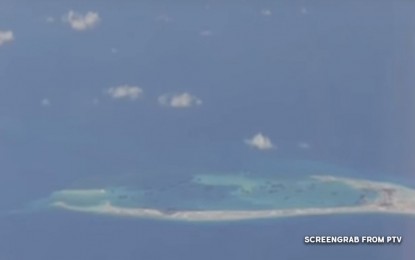
MANILA – The Philippines and China are "required to comply" with the 2016 landmark ruling on the South China Sea, Japan said Tuesday.
Japan made the statement as it joined the Philippines and several other nations such as the United States, Australia, France, Germany, and Denmark in commemorating the 6th anniversary of the award.
"As the Tribunal’s award is final and legally binding on the parties to the dispute under the provisions of the United Nations Convention on the Law of the Sea (UNCLOS), the parties to this case, the Philippines and China, are required to comply with the award," the Japan Ministry of Foreign Affairs said.
"The claim by China that it will not accept the award is against the principle of peaceful settlement of disputes in accordance with international law, in particular UNCLOS, and undermines the rule of law as a fundamental value of the international community," it added.
Japan reiterated its objection to maritime claims in the region that are inconsistent with UNCLOS, saying it remains "seriously concerned" about the current situation in the area.
Abide by the ruling
US State Secretary Antony Blinken said China must "cease its provocative behavior" in the region, adding that the US will continue to work with allies and partners, as well as regional institutions like Asean, to protect and preserve the rules-based order.
An armed attack on Philippine armed forces, public vessels, or aircraft in the South China Sea would invoke its 1951 Mutual Defense Treaty with the Philippines, he added.
Canada shared similar concern over "China’s continued unwillingness to accept the tribunal decision and ongoing coercive activities" in the East and South China Seas, including off the coast of the Philippines.
"Canada reaffirms its strong opposition to unilateral actions that escalate tensions and undermine regional stability and the rules-based international order. This includes China’s use of naval, coast guard, and maritime militia vessels to intimidate the ships of other states and assert unilateral claims over disputed features," the Canadian Embassy in Manila said.
"These actions are incompatible with China’s obligations under international law, including UNCLOS," it added.
The Hague-based arbitral tribunal, constituted under the UNCLOS, delivered in July 2016 a decision rejecting China's vast claims under its so-called nine-dash line in the South China Sea.
'Anchor' of PH policy
In a forum on Tuesday, Stratbase ADR Institute President Dindo Manhit urged the government to uphold its national sovereignty and territorial integrity through the landmark ruling and "collective action" with the international community.
He said the Marcos administration should "prioritize the development of policies that will allow the country to step up and strategically work with allies and partners to ensure" that international laws are followed.
Manhit added that at least 89 percent of Filipinos "agree" that the Marcos administration "must assert rights over the West Philippine Sea as stipulated in the award, citing a Pulse Asia survey conducted from June 24 to 27, 2022.
Philippine Ambassador to the US Jose Manuel Romualdez, meanwhile, underscored that the position of the Philippines regarding the South China Sea is clear: "We want to solve issues peacefully and in keeping with international law."
"President Ferdinand Marcos Jr. himself has recognized the significance of the 2016 Arbitral ruling, saying 'it is not a claim' but 'a territorial right,' even going so far as saying that we will not allow a single square millimeter of our maritime rights to be trampled upon," he said.
Also on Tuesday, no less than Foreign Affairs Secretary Enrique Manalo said the arbitral ruling would be the anchor of the country's policy and actions on the West Philippine Sea. (PNA)
